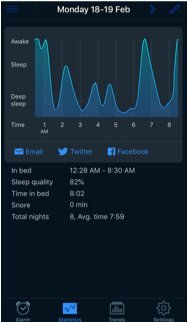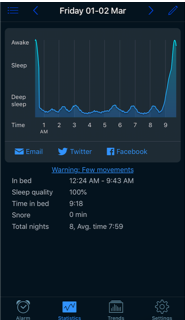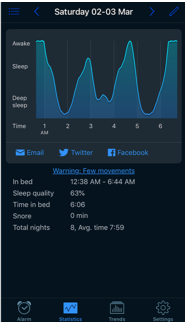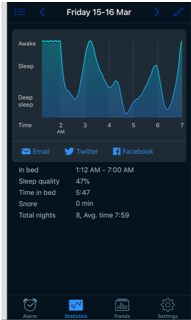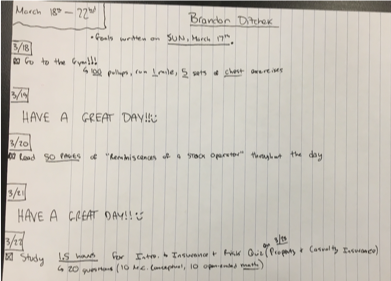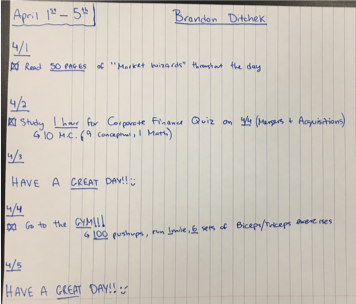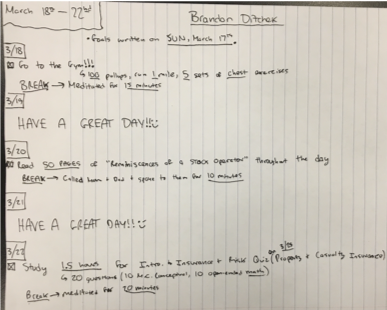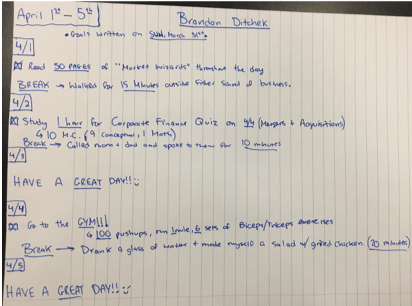52 Small Changes for the Mind
– Brett Blumenthal
GOAL: I will spend thirty minutes per week preparing my journal and getting 7-8 hours of sleep a night in order to better my mind and my perspective on life.
Mental health affects everyone. Whether it be feelings of anxiousness or feeling angry or violent, mental health issues are not to be taken lightly. After taking ESEPSY 1259 and reading 52 Small Changes for the Mind by Brett Blumenthal, I experimented with mind-improvement strategies and techniques. Additionally, I am happy to say that I did not encounter any problems or setbacks during my tracking strategies. My overall goal for this project was to improve the well-being of the mind and to do this I employed different strategies and challenges. Throughout this post I will share with you these strategies that I used over the last few weeks to improve my mind.
Strategy #1 – SLEEP
One strategy that stood out to me while reading 52 Small Changes for the Mind was getting enough sleep. Yes, you might say getting enough sleep during the night is a very general strategy, but I personally believe it is the most effective and efficient strategy to improving the mind. According to author Brett Blumenthal, getting 7-8 hours of quality sleep every night leads to clearer thoughts, less toxins in your brain, and an overall healthier and happier lifestyle. The average person spends about one-third of their life sleeping, so wouldn’t it make sense to treat your body and mind right and get quality sleep? You don’t need to answer that, because that answer is YES!! Additionally, according to Blumenthal, 7-8 hours of quality sleep leads to superior IQ, less stress, increased concentration, attention, and creativity. All of what I just listed is ESSENTIAL for not only improving your mind, but your lifestyle and overall well-being. With all that being said…I took matters into my own hands and tracked my sleep over the past few weeks using this great application called “Sleep Cycle.” Sleep Cycle tracks how many hours you are awake and sleeping while in bed. I used the app for 8 nights, with an average sleep time of seven hours and 59 minutes. I would definitely recommend this application to anyone, as it was extremely easy to use and truthfully fun to look back at the statistics of your sleep. Below, I have included screenshots of my sleep on February 18th, March 1st, 2nd, and 15th.
Strategy #2 – BE A GOAL SETTER
Documenting/journaling your goals can be a powerful tool for achieving anything really. Keeping a journal and documenting your goals forces you to commit to your goals to writing. In fact, journaling actually increases the probability that you accomplish your goals as opposed to just keeping them in your head. According to Blumenthal, journaling increases motivation, focus, creativity, and memory. So… over the past few weeks I wrote down three goals I wanted to accomplish each week. Every Sunday night I wrote down these three goals and crossed them off after I accomplished them. This strategy helped me focus on getting the tasks I deemed most important done and it improved my overall production as a student, as I was easily able to look back at the journal to see what I needed to do. Again, I would absolutely recommend this to any student, as it decreased my overall stress throughout the week. Furthermore, after accomplishing each goal and crossing it off the list, I felt super fulfilled, which ultimately eased my conscience and subsequently my MIND! Below, I have included two weeks of my goal setting in my journal. The weeks were March 18th – March 22nd and April 1st – April 5th.
Strategy #3 – TAKE A TIMEOUT
Whether a goal is studying for an hour, reading for 30 minutes, or just going to the gym, taking a ten-minute break to reflect on the (hopefully) accomplished goal not only calms the mind down, but makes you feel more confident in yourself. Knowing that you just accomplished something that your past-self felt was very important is an extremely empowering and tremendous feeling! According to Blumenthal, taking breaks throughout the day and after a goal is achieved encourages a person to act on those goals more often, due to the fact that they have something to look forward to after the goal is complete. Additionally, taking breaks increase your attention span, focus, and decrease stress, and unwanted thoughts. Some examples of breaks include taking a walk outside, stretching, calling a friend, meditating, or eating a healthy meal. Personally, I found that meditating is the most effective break taking strategy, as it increases calmness, peace, and learning ability. The recommended time for taking a break is 10-15 minutes, according to the book. So… to test this strategy out individually, underneath my three weekly goals in my journal I wrote down what I did during my ten-minute breaks after accomplishing each goal. Now obviously I didn’t just take three breaks throughout the entire week, the ones I recorded were the breaks I took after completing a big assignment/goal. I found that this strategy improved my production and confidence. Below, I added the three breaks I took during the weeks of March 18th – March 22nd and April 1st – April 5th.
TAKEAWAYS
This project was really awesome. I can’t name any other time during school where I have been able to work so independently towards a goal of mine, and actually see results from it. All jokes aside, this year in general has not been the easiest for me. Class have been tough and as a result, my mind hasn’t been in the right place. The fact that I was able to take a class where I could choose a goal to better mind and my perspective on all things life is a blessing in disguise, and I am extremely grateful that this course exists. From doing this project, I learned that it doesn’t just take an assignment and a due date for a student to take action. For example, I have employed several other mind improvement strategies not listed in the project that have worked wonders on my self-esteem, confidence, and overall well-being. Additionally, I know now that if I need to get things done, I have the resources and knowledge to prepare accordingly and appropriately. Furthermore, reaching my goal for this project not only made me feel good about myself because of the activities that improved my mind, it also gave me the courage to tackle the obstacles I face on an everyday basis. I specifically made my goal hard to reach, so that if I did reach it, I know I would be able to reach any goal. It is tough to keep up with a journal and get consistent 7-8 hours of sleep a night, especially in college where everyone is running around trying to keep their head above water. Overall, this project was a blast and I am super happy I was able to be a part of it. I hope you guys enjoyed this blog post. I put a lot of time into making it come together over the past semester, and I was extremely excited to share all the great strategies I learned from the book, 52 Small Changes for the Mind.

